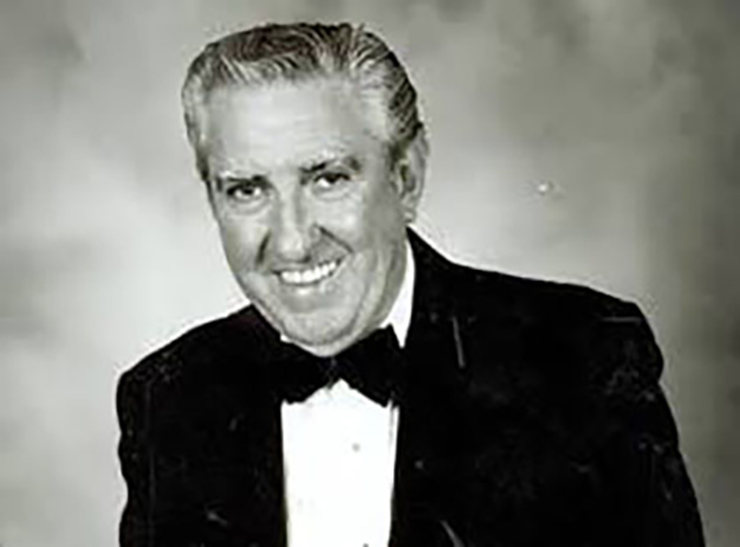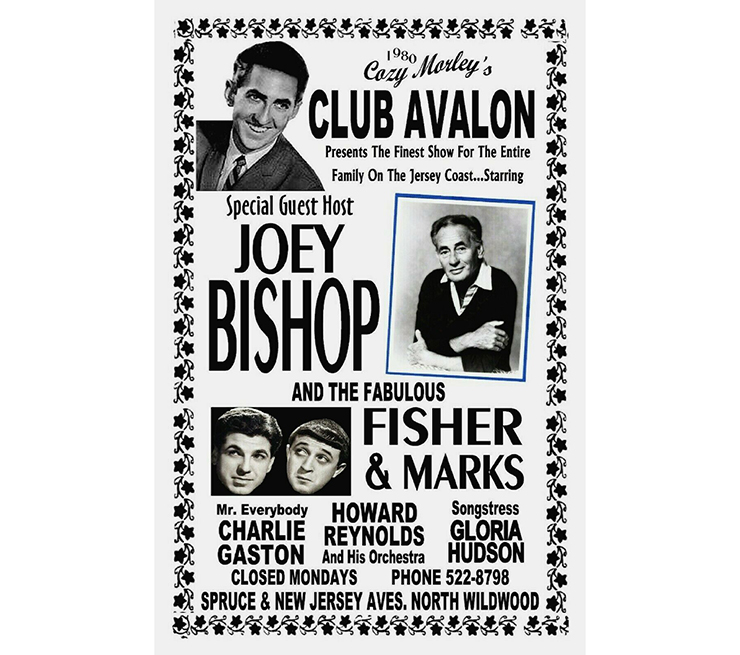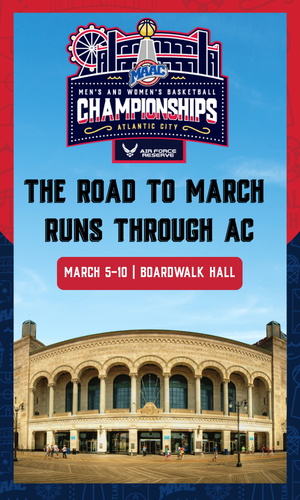By Bruce Klauber
“On the way to Cape May, I fell in love with you.
On the way to Cape May, I saw my dreams come true.
I was taken by your smile, as we drifted by Sea Isle.
My heart was really gone when we reached Avalon.”
Sung and recorded by
Thomas Francis “Cozy” Morley.
When musicians of a certain age gather, stories are told; some of them true. One of those stories focused on the late and legendary comedian and nightclub owner, Cozy Morley.
It seems that Morley, owner of the ramshackle Club Avalon in North Wildwood, walked into a Wildwood car dealership one afternoon in the late 1960s. He had his eyes on a new Cadillac sitting in the showroom. Morley was dressed like a bum that day, to put it simply.

A salesman came up to him and indicated that Morley could never even think of affording such a vehicle, and then he tried shooing him out of the showroom.
Morley looked the salesperson square in the eye and asked, “How much?” A figure, probably in the neighborhood of $6,000 in those days, equivalent to about $42,000 today, was mentioned.
Cozy Morley reached into the pocket of his pants, pulled out a wad of $1,000 bills, peeled off six of them, and handed it over to the astonished salesman. The lesson here? Cozy Morley only looked like a bum.
A “Cozy Morley” couldn’t be invented today. He was a unique comic who worked clean. His show was a family show. He was considered, in some quarters, corny, even in his prime. And building a club like Morley’s Club Avalon today would be impossible.
Although the Morley name was and is closely associated with Wildwood, he spent a good deal of time performing in Atlantic City and surrounding areas, especially after his club closed in 1989 after being condemned by city.
Press of Atlantic City writer Lori Hoffman attended his show at the Sands in 2000. “He’s a terrific performer whose fans adored him,” Hoffman wrote.
He was a regular at Harrah’s and the Taj Mahal, and did a number of afternoon shows through the years that were specifically geared to the daytime visitors who came to Atlantic City from Philadelphia and New York by bus.
I worked with Cozy from time to time, in and out of his club, but the real treat was watching him work. His rapid-fire routine, family friendly but not always politically correct, was simply hilarious. In retrospect, his shtick was basically a series of one-liners about different nationalities, growing up Catholic in South Philadelphia, and routines about “the old days,” all tied together via his stock phrase, “But it’s a wacky world, isn’t it?”
One of the more incredible things about those Atlantic City shows was that nuns were almost always in the audience. A lot of nuns. And during Morley’s sets, several of them were furiously writing down his jokes on sheets of notebook paper. The nuns loved him. And it seems everyone else did, too.

He was a humanitarian as well, raising a lot of funds during the years for his beloved Wildwood. In tribute to the comic, an 8-foot bronze statue of Morley, constructed and dedicated in his honor in 2003, now stands in front of Westy’s Irish Pub in North Wildwood, site of the former Club Avalon.
Cozy, along with Fisher and Marks, Phil Jaye, The Day Brothers, Tony Santoro, Davis and Reese, and many others, was one of a slew of performers who came out of the Philadelphia area. A few, like the teams of Al Fisher and Louie Marks, The Day Brothers, and Pepper Davis and Tony Reese, combined comedy and music, and made it to the periphery of national fame. Morley chose, by and large, to stay in the area, and became successful mainly because he managed to fill his 1,100-seat nightclub every season from 1958 until 1989.
Agent Eddie Suez discovered Morley around 1949. The comic, who also played banjo and clarinet very, very well, was knocking around the Philadelphia area, performing in clubs when he came to Suez’ attention. Suez, among the best known of the Philadelphia talent agents for years, had a soft spot for Morley.
In 1958, Suez sold a club he owned in North Wildwood to Morley for $10,000. Club Avalon featured the comic as headliner, the Howard Reynolds orchestra, and in one of his last jobs anywhere, Johnnie Ray. Club Avalon, no matter who was on the bill with Cozy Morley, was a success and remained successful until its closing.
A good part of Morley’s act through the years had to do with the venue itself, which always seemed to be in various states of disrepair. Morley was fond of referring to the club as “a toilet” because it was so dirty. If it was raining, the roof would leak, and there was no air-conditioning, only fans in the windows and in the ceiling. Suez hadn’t put a dime into the place in years and Morley spent maybe three times that much – that would be 30 cents – nailing in a few loose floorboards and shoring up the plywood tables. And that’s about all he did.
But the joint, and it was a “joint,” was packed to capacity every night. “He made his money talking down the place,” said Morley’s friend Bob Bright. “The place should have been condemned early on, but it was so much fun,” said Club Avalon regular Bob Forstburg.
In 1995, The New York Times wrote about the club. “Club Avalon was a barn,” said Times’ writer Bill Kent. “Every night of the week in the summer, he would get a thousand people in there, bring on three or four acts, put on a show that lasted at least four hours, then come down to the bar with his banjo and hang out with the people until two in the morning.”
As a comic he knew it was probably an anachronism, but audiences couldn’t get enough. Even though demographics and the landscape of the shore had changed drastically through the years, Club Avalon still packed them in until its last summer.
In 1989, the club was condemned and torn down. Morley wanted to rebuild, but was told that all his grandfather clauses were exhausted, and that a new club could only have a seating capacity of 165. That wouldn’t work, so it was off to the Atlantic City casinos where there was more than enough lucrative and steady work. He retired to Ft. Lauderdale, Fla. around 2003, when the statue was unveiled after 58 years in the business.
Cozy Morley died in August of 2013. He was 87. But the jokes live on. And they probably will forever.
“There was this Philadelphia cop who saw a horse die on Moyamensing Avenue. When the cop was filling out his report, he realized he couldn’t spell Moyamensing, so he dragged the horse to Second Street.”
– Cozy Morley.












Thank you for remembering Cozy Morley and for the great article. I worked at Club Avalon a few summers with a band that opened the show for Joey Bishop. Fond memories and the end of an era that will never be again. I published a book of short horror stories about set in Wildwood and Cape May called WITCHES OF WILDWOOD which captures the essence of Wildwood of the 80’s.
Thank you for remembering Cozy Morley and for the great article. I worked at Club Avalon a few summers with a band that opened the show for Joey Bishop. Fond memories and the end of an era that will never be again.
I also published a book of short horror stories about set in Wildwood and Cape May called WITCHES OF WILDWOOD which captures the essence of Wildwood of the 80’s.
Cozy was the best my husband Howie was his bandleader. And he was the best man at our wedding omg I miss working there